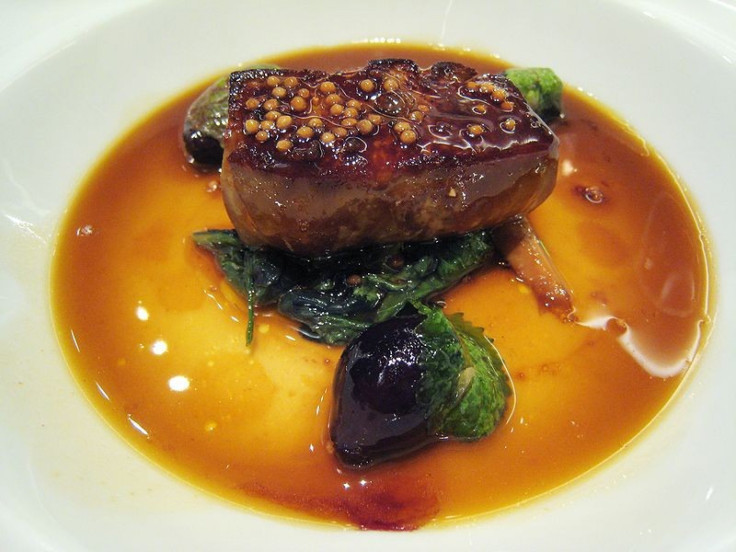France Declares War On California: The Battle Over Foie Gras

President Francois Hollande has defended one of his nation’s many gourmet delicacies, foie gras, in response to the State of California’s decision to ban the production and sale of the tasty product on grounds of animal cruelty.
The Daily Telegraph newspaper of Britain reported that France produces more than 16 million tons of foie gras every year, principally by force-feeding corn to ducks and geese in order to enlarge their livers. Only 3,000 tons are exported, however.
Britain has already banned the production of foie gras, but has not yet prohibited their import. Force-feeding has also been banned in Austria, Germany, the Czech Republic, Finland, Italy, Luxembourg, the Netherlands, Norway, Poland, South Africa, Sweden, Switzerland, Denmark, and Israel.
Speaking at a foie gras farm over the weekend in Monlezun in the southwestern part of France, Hollande said he “would not let foie gras exports be jeopardized, especially in certain countries, or certain states in America,” a reference to California, which outlawed foie gras on July 1.
The French president said he will vociferously argue his case and “if necessary, I’ll bring as much as needed to [the] authorities.”
“I think they will listen,” he added.
“We wish we could have more of it here in France, and sometimes cannot, due to lack of purchasing power -- I wouldn’t want to deprive the Americans!”
On a more serious note, Hollande said California's ban on foie gras violates the principles of free trade and cited that the production of the delicacy adheres to the strictest sanitary laws of Europe.
“Foie gras is a great French product that is an honor to those devoted to it,” he said. “They [the Americans] can’t defend free trade and forbid a good product like foie gras.”
It is unclear what Hollande can do to repeal California’s law, although he half jokingly suggested he would send free foie grad to American lawmakers to persuade them as to its benefits.
France remains the number one producer and consumer of foie gras – indeed, under French law the product is part of the “protected cultural and gastronomical heritage of France.”
The California prohibition on foie gras was originally drawn up in 2004 by John Burton who was then the State Senate president and now serves as the chairman of the California Democratic Party, citing the cruelty of force-feeding the birds to fatten their livers.
"How would you like to have a tube crammed down your throat and corn forced down it? It's very inhumane," he said, according to the Telegraph.
"Any restaurant that serves foie gras is a high class restaurant so I don't think they'll be going broke because of this."
The people for the Ethical Treatment Animals (PETA) takes a similar dim view of foie gras.
“To produce foie gras… workers ram pipes down male ducks' or geese's throats two or three times daily and pump as much as four pounds of grain and fat into the animals' stomachs, causing their livers to bloat to up to 10 times their normal size,” PETA said.
“Many birds have difficulty standing because of their engorged livers, and they may tear out their own feathers and cannibalize each other out of stress.”
PETA added that the birds are “kept in tiny wire cages or packed into sheds. On some farms, a single worker may be expected to force-feed 500 birds three times each day. Because of this rush, animals are often treated roughly and left injured and suffering.”
© Copyright IBTimes 2024. All rights reserved.











